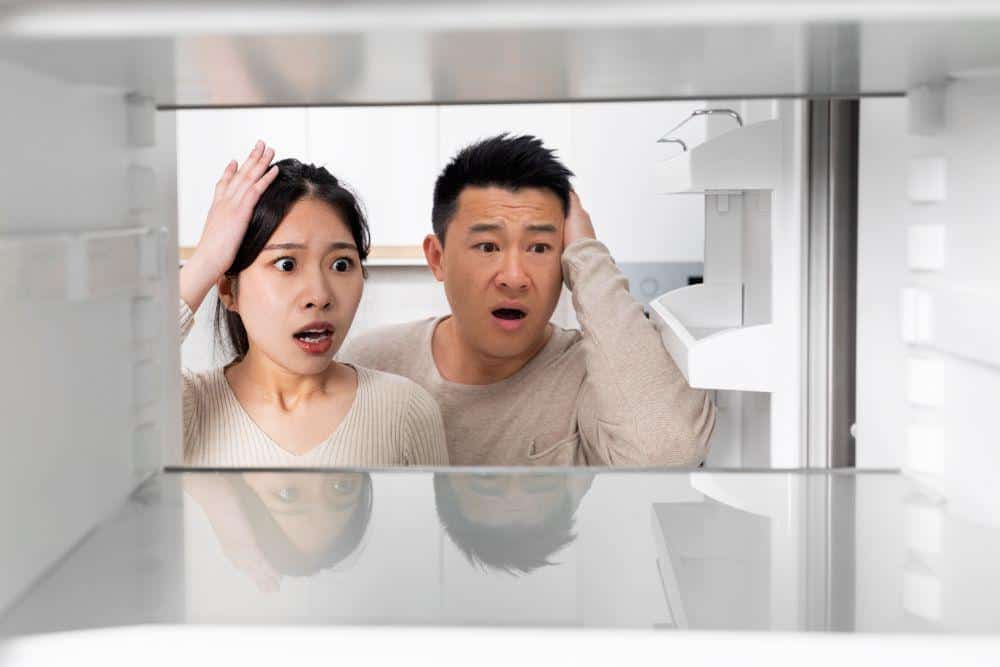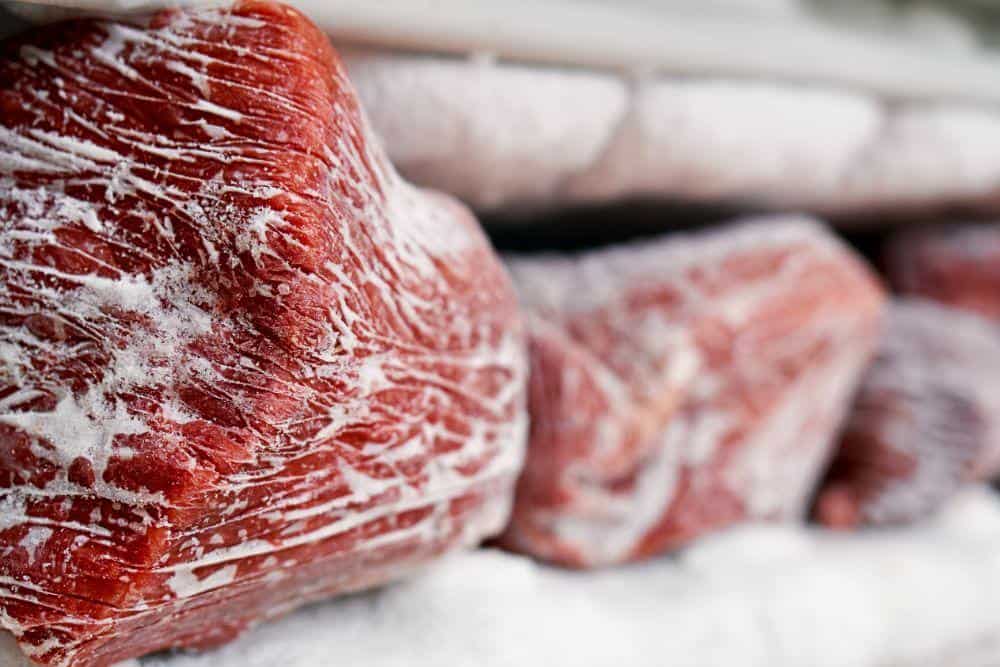When dealing with GE freezer problems, knowing the most common issues can help you troubleshoot and fix them. In this section, we provide tips to identify common problems. While we have a wealth of information available to you throughout this post, we also have helpful links to GE Appliances that are summarized below:
GE Owner’s Manuals and Installation Instructions - On this page, you can look up information about your GE Freezer and get your owner’s manual. Just enter your model number on the page and resources specific to your freezer will be returned.
GE Freezer, Ice maker and Refrigerator Troubleshooting - On this page, you can enter the problem that you have been experiencing with your freezer and enter it into the page to try to find a solution to your problem.
GE Fridge Freezer Troubleshooting Guide - This page contains some of the most common issues that consumers experience with their GE Freezer. Common problems addressed on this page include:

A Broken Freezer Can Lead to a Double Whammy of Expensive Costs - Including Food Loss and Repair Cost
If your appliance isn't freezing well, there are multiple factors to check. Often, it's due to simple reasons like the fridge not plugged in properly, a plug is incorrectly lodged inside the socket, or the door not closing tightly.
Inspect the door seal for damage, as a cracked gasket will let warm air in. Additionally, blockages in the condenser coil or a malfunctioning evaporator fan motor might be the culprit. Other causes include a faulty start relay or a defective temperature control thermostat.
Too much frost in your freezer can indicate a problem with the defrost cycle of your freezer (or fridge freezer). Components such as the defrost timer, defrost heater, or defrost thermostat may require inspection or replacement. In case you are uncomfortable inspecting these parts yourself, consider scheduling a service with GE Appliances Factory Service.

A Freezer Door That Has Been Left Open or a Problem with Automatic Defrost Can Lead to Frost Buildup in Your Freezer
Temperature problems can oftentimes be the result of accidental temperature setting adjustments, broken thermostats, or blocking freezer vents.
A broken thermostat can lead to temperature issues in your freezer. To determine if the thermostat is the problem, first make sure that the temperature is set properly. Accidentally resetting the temperature can result in your freezer being maintained at the wrong temperature.
Make sure you don’t have any large items or food boxes blocking freezer vents
Your GE freezer door plays a crucial role in maintaining cooling capacity. If the freezer door doesn't close properly or its seal is damaged, warm air can enter, causing moisture or frosting issues. Inspect the freezer door and the gasket for damage, and replace them if necessary to maintain optimal airflow and cooling.
When it comes to GE freezer troubleshooting, several methods can help diagnose and fix common issues. These include:
Look for any cracks or damage on your door seal. Note that in some cases, especially if you're looking for replacement parts, a door seal is commonly referred to as a gasket. If damaged, warm air may enter your freezer, causing temperature issues. You can check GE Appliances Factory Service for more details on troubleshooting an issue in the door seal.
Dirty condenser and evaporator coils may result in your freezer not cooling effectively. Regular cleaning ensures efficient heat transfer and prevents the buildup of dust and dirt. To clean your evaporator coil, use a refrigerator coil brush or a vacuum hose with a soft brush head. Find more cleaning tips on GE's support page.
Get to know if the evaporator and condenser fans are functioning correctly. They should spin freely and blow cold air. Inspect the fans for any signs of wear or damage. Replace the fans if necessary.
A faulty defrost system may cause your freezer to ice up, leading to a temperature increase. Examine the defrost heater, defrost thermostat, and defrost timer for any issues. Replace any damaged parts to ensure proper defrosting.
The thermostat regulates your freezer temperature, while the control board manages its overall functioning. This gets pretty technical, so you’re probably best off contacting GE directly or getting in touch with an appliance repair pro.
If you’re highly experienced with electronics and freezers, you can check both components to ensure they are working correctly. Replace them if you find any issues - again, this step is best left to professionals.
Following the methods mentioned above should help you troubleshoot common GE freezer problems effectively. Remember to consult your freezer's user manual for specific instructions (links provided at the top of this article) and always practice safety measures when working with electrical appliances.
When your GE freezer needs maintenance or repair, trust the experts to help you. There are two main options: GE Appliances Factory Service and finding a licensed technician or repair service.
For efficient and reliable service, GE Appliances Factory Service is often the best choice. To schedule a service:
On the day of your appointment, expect a call and a text, allowing you to track your technician's arrival.
Ensure a qualified, licensed technician handles your GE freezer repair. To find a reliable service:
Whether you choose GE Appliances Factory Service or a local technician, timely and professional repairs help prolong the life of your GE freezer.
When dealing with GE freezer issues, you can find essential support and resources to help you. This section covers GE model number identification, and instructional, and diagnostic videos.
To start your troubleshooting journey, it's crucial to identify your GE freezer model number. The GE Appliances Support page can guide you in finding the model/serial tag on your freezer. This tag is often located inside the appliance or on the back. Once you have that information, you can look up support materials specific to your model.
GE Appliances offers a collection of instructional and diagnostic videos that provide step-by-step guides to help you troubleshoot and resolve common freezer issues. Topics covered include condenser fan motor replacement and performing a continuity test.
In some cases, videos on their support site will tell you when the “problems” you’re experiencing aren’t actually problems. If your bottom freezer refrigerator appears to be making a lot of weird noises, this may not be a problem after all. The video below shows what noises are “normal” for your fridge freezer to make - and do not require a service call.
Normal Sounds on GE Bottom Freezer Refrigerators
Your freezer's health is important. By utilizing GE's support resources, you can maintain or restore its functionality with confidence.
Resetting your GE freezer may help in fixing minor issues. Follow these steps:
- Unplug your freezer from the power source.
- Wait for about 10 minutes.
- Plug the freezer back in and observe if the issue is resolved.
If the problem still persists, seek assistance from a qualified technician.
Frost buildup in your GE bottom drawer freezer could be due to several factors. One common cause is an improperly closed door. Make sure the door is closed tightly and the seals are not damaged. Another potential cause is excessive humidity in the room where the refrigerator is located. Finally, a faulty defrost system could also lead to frost accumulation. Addressing these issues will help prevent frost buildup and ensure that your freezer works efficiently.
If your GE bottom freezer is not freezing, there might be several reasons. First, ensure you have properly adjusted the temperature controls. Second, check for blocked air vents. If the vents are blocked, cool air won't be distributed properly, and the freezer won't cool effectively. Lastly, examine the door seals for any breaks or leaks, as these can cause cold air to escape. Regularly cleaning your refrigerator, including the condenser coils, will also optimize its performance.
